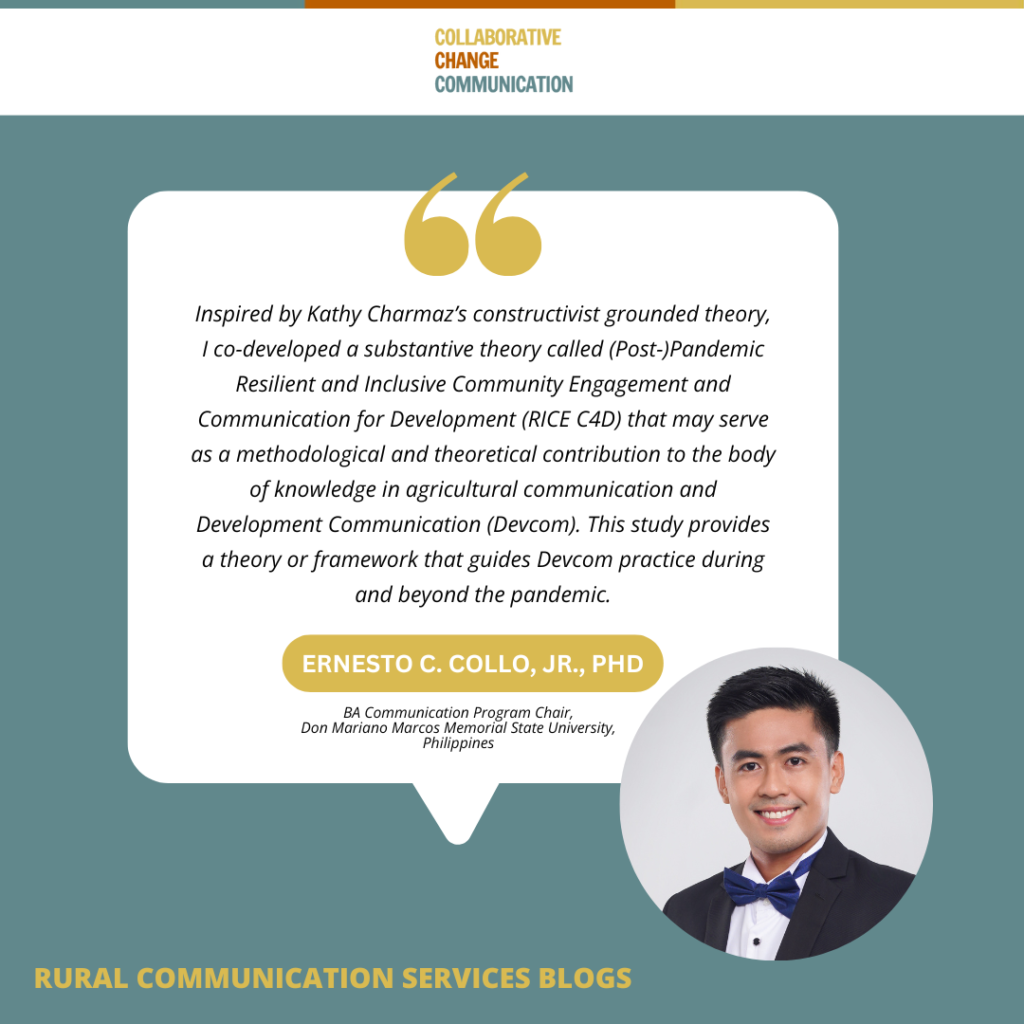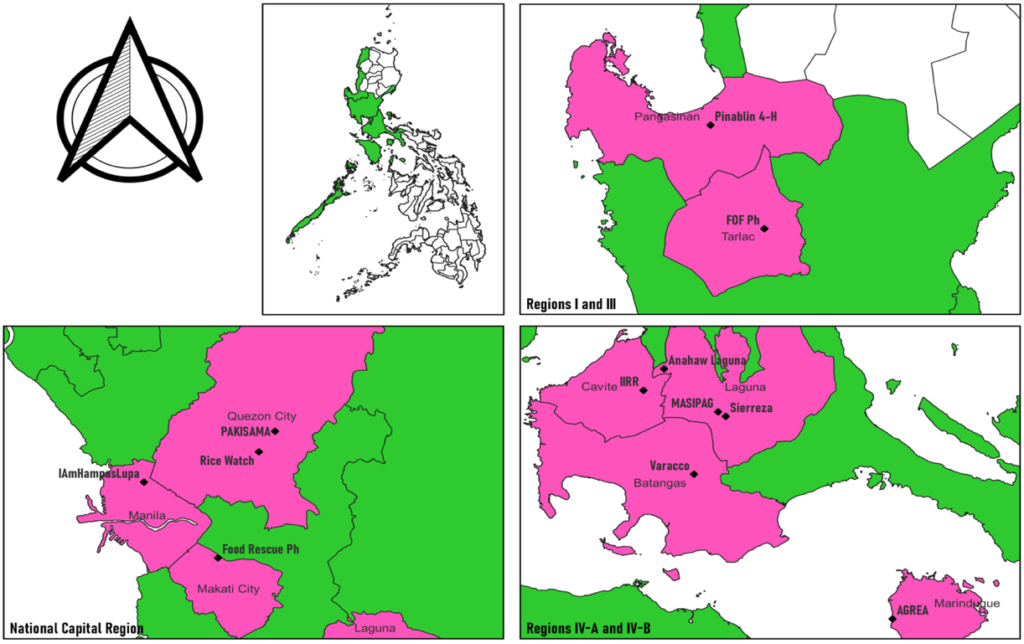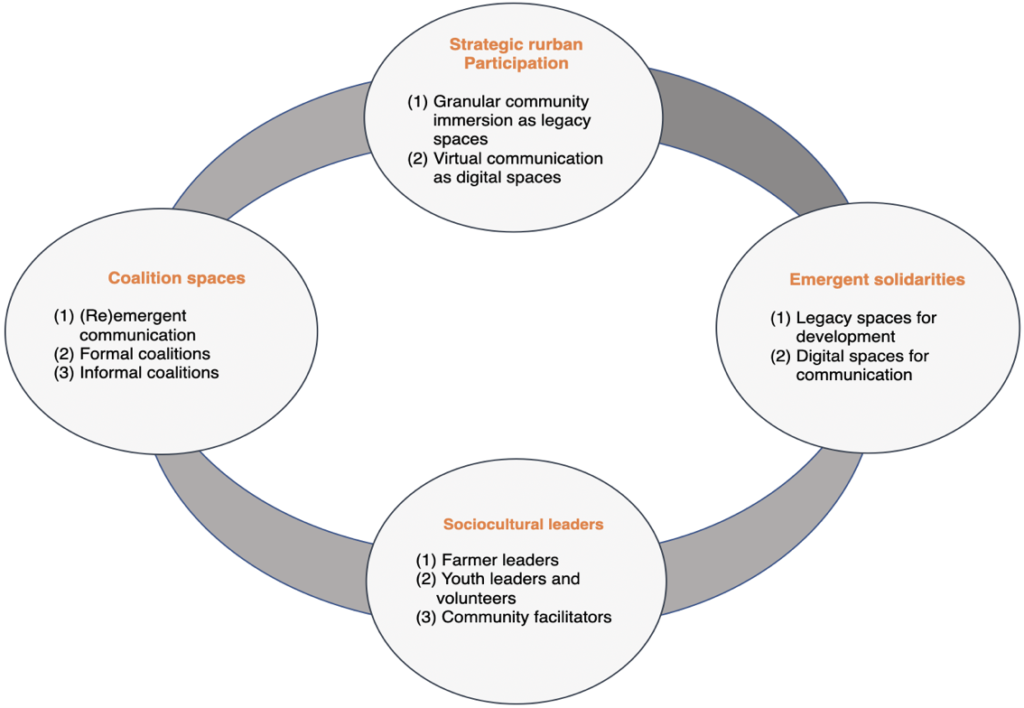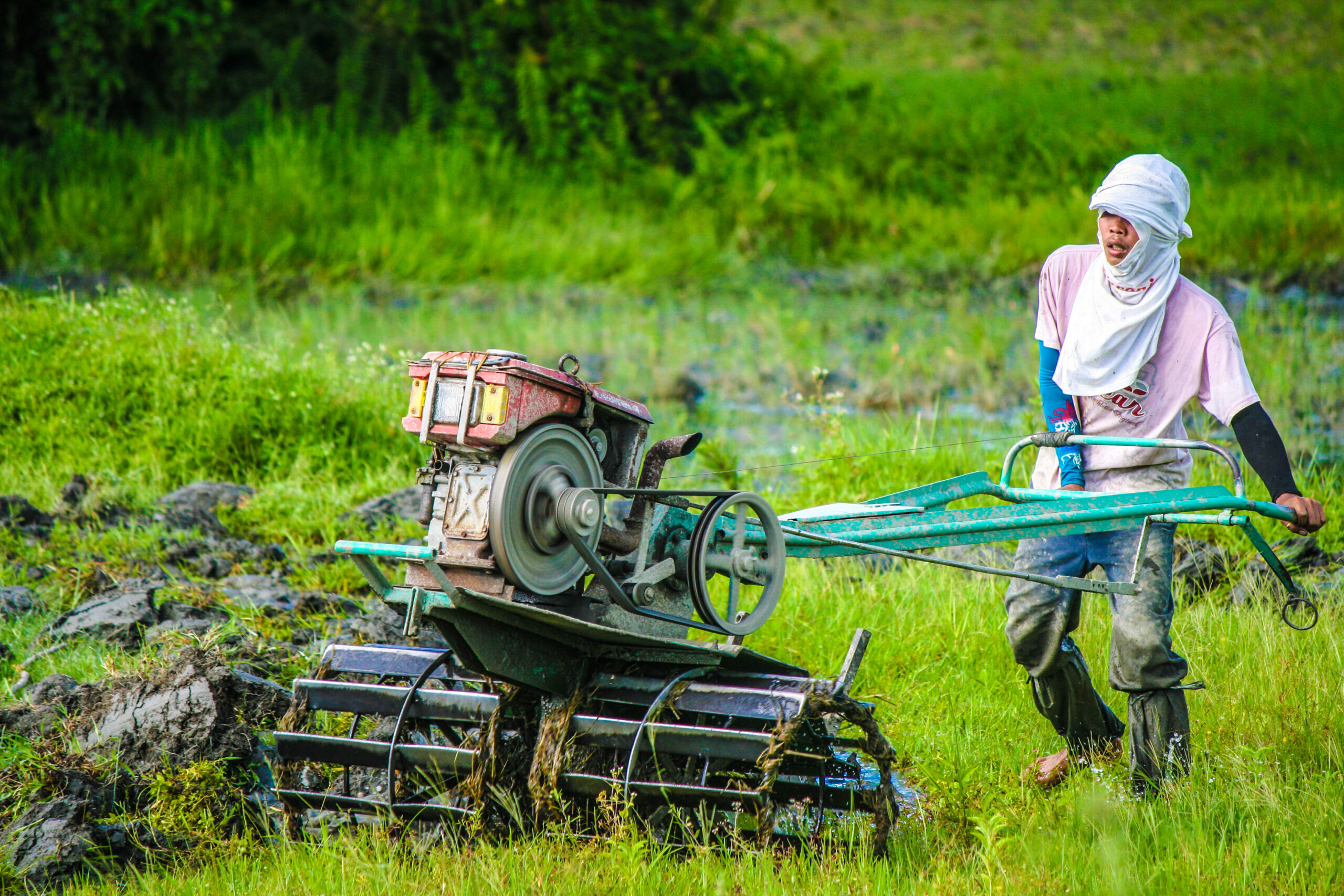The COVID-19 pandemic has revealed the gaps in the delivery of quality services confronting the agricultural sector in the Philippines. This phenomenon made development work difficult due to issues of social mobility that restricted the delivery of essential services and the implementation of projects among rural and Indigenous communities.
While development workers have long engaged frameworks in project cycle management, the pandemic clearly challenged the established methodologies and communication acts that guide development work. The new avatar of Development Communication (Devcom) practice pursues an “agent-oriented view of individuals and communities engaged in directed social change” (Melkote & Steeves, 2015, p. 395).

I spoke with 12 civil society founders and community leaders in the Luzon Island of the Philippines (see Figure 1). These founders and leaders work closely with community farmers and farming families who carry the brunt of “new economic systems and corporations” as introduced by the “growth of neoliberal capitalist market” (Jones et al., 2017, p. 2). Exacerbating this dilemma are the millions of agricultural damages incurred by the country due to the devastating typhoons in 2020 (Brul, 2021) and the wide-ranging impacts of the COVID-19 pandemic from 2020 to 2022.

Central to the theory developed for this study is an inquiry about the values important to the conduct of development work. The 12 founders and leaders (see Table 1) are witnesses to the commonplace plight of community farmers in rural areas.
Table 1. Embracing the forms of social compass as pandemic-resilient values
| DEVELOPMENT WORKERS | CIVIL SOCIETY ORGANIZATIONS | ROLES/ POSITIONS | EDUCATION |
| Cherrys O. Abrigo | Sierreza Zero-Waste Store and Artisan Café | Founder | BS Engineering (UPLB) |
| Ariestelo A. Asilo | Varacco, Inc. | Co-founder | BS Nutrition (UPLB) |
| Ryan M. Bestre | IAmHampasLupa Ecological Agriculture Movement, Inc. | Campaigner/ Founder | BS Environmental Science (BSU) |
| Jordan G. Calura | For Our Farmers Ph, Inc. | Head of Operations | BS Agriculture (CLSU) |
| Mac T. Florendo | Food Rescue Philippines | Founder | BA Communication (Silliman U) |
| Justin D. Interno | Anahaw Laguna | Founder | BS Agriculture (UPLB) |
| Christine F. Jodloman | AGREA Agricultural System International, Inc. | Associate Director | BA Communication Arts (UPM) |
| Melissa A. Obias | Pambansang Kilusan ng Samahang Magsasaka | Program Coordinator | BS Devcom (UPLB) |
| Cris C. Panerio | Magsasaka at Siyentipiko Para sa Pag-unlad ng Agrikultura | National Coordinator | BS Engineering (UPLB) |
| Gerald L. Quinit | Pinablin 4-H Calasiao Inc. | Federated President | BS Agriculture (Pangasinan SU) |
| Magnolia M. Rosimo | International Institute of Rural Reconstruction | Program Manager | BS Social Sciences (UPB) |
| Hazel A. Tanchuling | Rice Watch Action Network Inc. | Executive Director | BS Community Development (UPD) |
In this study, I define the legacy social compass as time-honored set of values that has stood the test of time and may be applied in philosophy and practice while emergent social compass is a new roster of values which development workers embrace to respond to the challenges of the current time. Table 2 shows these legacy and emergent values that guide the practice of development work during and beyond the pandemic.
Delving comprehensively into the intensive sequential e-dialogues has allowed me to document and make sense of the rich array of continuing and emerging processes during the pandemic. Inspired by Kathy Charmaz’s constructivist grounded theory, I co-developed a substantive theory called (Post-)Pandemic Resilient and Inclusive Community Engagement and Communication for Development (RICE C4D) that may serve as a methodological and theoretical contribution to the body of knowledge in agricultural communication and Devcom. This study provides a theory or framework that guides Devcom practice during and beyond the pandemic.

A substantive theory (Collo, 2022)
Theorizing is the foundation of any “mature science” (Kuhn, 1962). Filipino-centric philosophies and theories guided the scholarship of Devcom throughout recent history, but there continues to be a propensity for Western paradigms (Dissayanake, 2009; Wang & Kuo, 2010).
This study is a decolonial project that looks into the experience of Filipino farmers. RICE C4D forwards four general, emergent critical components that articulate the possibilities of ongoing processes and practices on the ground during and beyond the pandemic.
Table 2: Embracing the forms of social compass as pandemic-resilient values
| LEGACY SOCIAL COMPASS | EMERGENT SOCIAL COMPASS |
| Co-equal knowledge production | Foresight and futures thinking |
| Social justice | Agripreneurial and technological innovations |
| Pakikipagkapwa-tao and Authentic multistakeholder participation | Protection of human health and safety |
Figure 2 illustrates the components of RICE C4D: sociocultural leadership (component 1)that acknowledges a new breed of community actors; multi-stakeholder coalition spaces (component 2)that recognize the complementary roles of emergent communication and (in)formal coalitions; strategic rurban participation (component 3) that encourages the genuine engagement of rural and urban communities in the planned and judicious practice of development work through granular community immersion as legacy spaces and virtual communication as digital spacesleading to the creation of an online village; and emergent solidarities (component 4) that fosters the power of agency toward the (re)creation of physical and social spaces for development and the purposive pivot to digital spaces for communication.
The scholarship of Devcom inspires many of us to continue trailblazing the legacy of the Los Baños School of Devcom by understanding novel phenomena and exploring the promise of theorizing as part of our continuing quest for disciplinal maturity.
More importantly, this study recognizes the emergence of a substantive theory that (re)defines the praxis of development work during a public health crisis. New and adaptive processes have been strategically embedded in development work to complement the changing landscape. This emergence, however, does not replace the conventions but reevaluates their limits during the pandemic.
Blog contributed by Dr. Ernesto C. Collor Jr, BA Communication Program Chair at Don Mariano Marcos Memorial State University, Philippines.
Cover photo from Asian Farmers’ Association for Sustainable Rural Development (AFA).
References:
Brul, B. (2021, May 19). The continuing toll of the COVID-19 pandemic on farmers in the Philippines. Grameen Foundation. https://grameenfoundation.org/stories/blog/the-continuing-toll-of-the-covid-19-pandemic-on-farmers-in-the-philippines
Dissanayake, W. (2009). The production of Asian theories of communication: Contexts and challenges. Asian Journal of Communication, 19(4), 453-468. http://dx.doi.org/10.1080/01292980903293411
Jones, T., Miller, A., Montoya, G., Zhang, C., & Abadia-Barrero, C. (2017, December 8). What is negotiated? The effects of neoliberal capitalism on farmers. University of Connecticut. https://anthropology.uconn.edu/wp-content/uploads/sites/944/2018/02/What-is-Negotiated-The-Effects-of-Neoliberal-Capitalism-on-Farmers-.pdf
Kuhn, T. (1962). The structure of scientific revolutions. The Folio Society.
Melkote, S., & Steeves, L. (2015). Place and role of development communication in directed social change: A review of the field. Journal of Multicultural Discourses, 10(3), 385-402. https://doi.org/10.1080/17447143.2015.1050030
Wang, G., & Kuo, E. (2010). The Asian communication debate: Culture-specificity, culture-generality, and beyond. Asian Journal of Communication, 20(2), 152-165. https://doi.org/10.1080/01292981003693344


Comments are closed, but trackbacks and pingbacks are open.